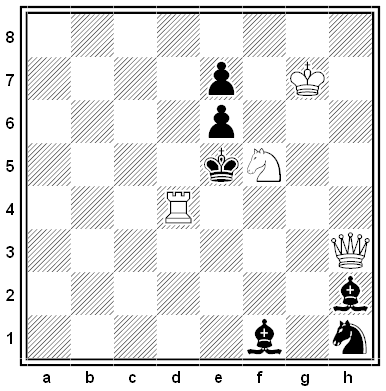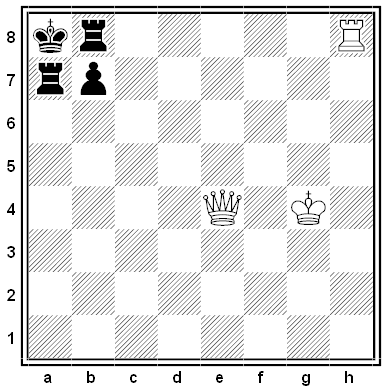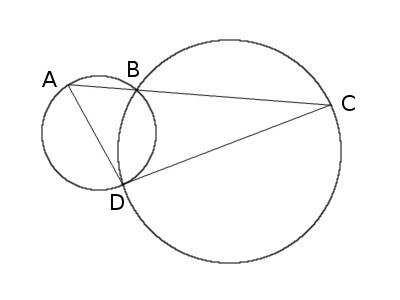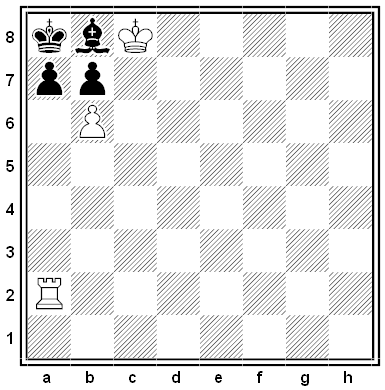You’re a logician who wants to know which of two roads leads to a village. Standing nearby, inevitably, are three natives: one always lies, one always tells the truth, and one answers randomly. You don’t know which is which, and you can ask only two yes-or-no questions, each directed to a single native. How can you get the information you need?
Puzzles
Black and White
Hot and Cold
Suppose you have three identical Dewar flasks labeled A, B, and C. (A Thermos is a Dewar flask.) You also have an empty container labeled D, which has thermally perfect conducting walls and which fits inside a Dewar flask.
Pour 1 liter of 80°C water into flask A and 1 liter of 20°C water into flask B. Now, using all four containers, is it possible to use the hot water to heat the cold water so that the final temperature of the cold water is higher than the final temperature of the hot water? How? (You can’t actually mix the hot water with the cold.)
A Dice Puzzle
Timothy and Urban are playing a game with two six-sided dice. The dice are unusual: Rather than bearing a number, each face is painted either red or blue.
The two take turns throwing the dice. Timothy wins if the two top faces are the same color, and Urban wins if they’re different. Their chances of winning are equal.
The first die has 5 red faces and 1 blue face. What are the colors on the second die?
Black and White
Weighty Matters
From the Second All Soviet Union Mathematical Competition, Leningrad 1968:
On a teacher’s desk sits a balance scale, on which are a set of weights. On each weight is the name of at least one student. As each student enters the classroom, she moves all the weights that bear her name to the other side of the scale.
Before any students enter, the scale is tipped to the right. Prove that there’s some set of students that you can let into the room that will will tip the scale to the left.
Stretch Goals
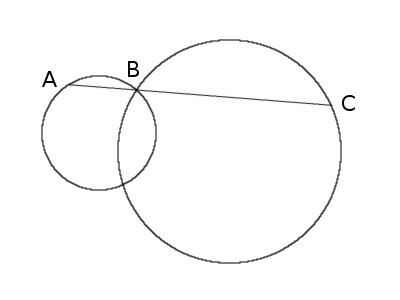
Two circles intersect. A line AC is drawn through one of the intersection points, B. AC can pivot around point B — what position will maximize its length?
Black and White
Dirty Work
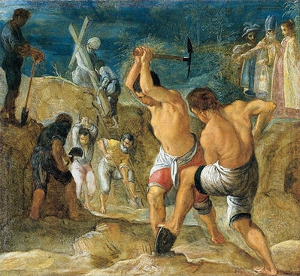
A puzzle by Pierre Berloquin:
Timothy, Urban, and Vincent are digging identical holes in a field.
- When Timothy and Urban work together, they dig 1 hole in 4 days.
- When Timothy and Vincent work together, they dig 1 hole in 3 days.
- When Urban and Vincent work together, they dig 1 hole in 2 days.
Working alone, how long does it take Timothy to dig one hole?
A Poetic Puzzle
On Oct. 25, 1875, Lewis Carroll sent this verse to Mrs. J. Chataway, mother of one of his child-friends, Gertrude. “They embody, as you will see, some of my recollections of pleasant days at Sandown”:
Girt with a boyish garb for boyish task,
Eager she wields her spade — yet loves as well
Rest on a friendly knee, the tale to ask
That he delights to tell.
Rude spirits of the seething outer strife,
Unmeet to read her pure and simple spright,
Deem, if you list, such hours a waste of life,
Empty of all delight!
Chat on, sweet maid, and rescue from annoy
Hearts that by wiser talk are unbeguiled!
Ah, happy he who owns that tenderest joy,
The heart-love of a child!
Away, fond thoughts, and vex my soul no more!
Work claims my wakeful nights, my busy days:
Albeit bright memories of that sunlit shore
Yet haunt my dreaming gaze!
He asked her leave to have it published. The child in the verse is not named — why should he feel obliged to ask permission?

